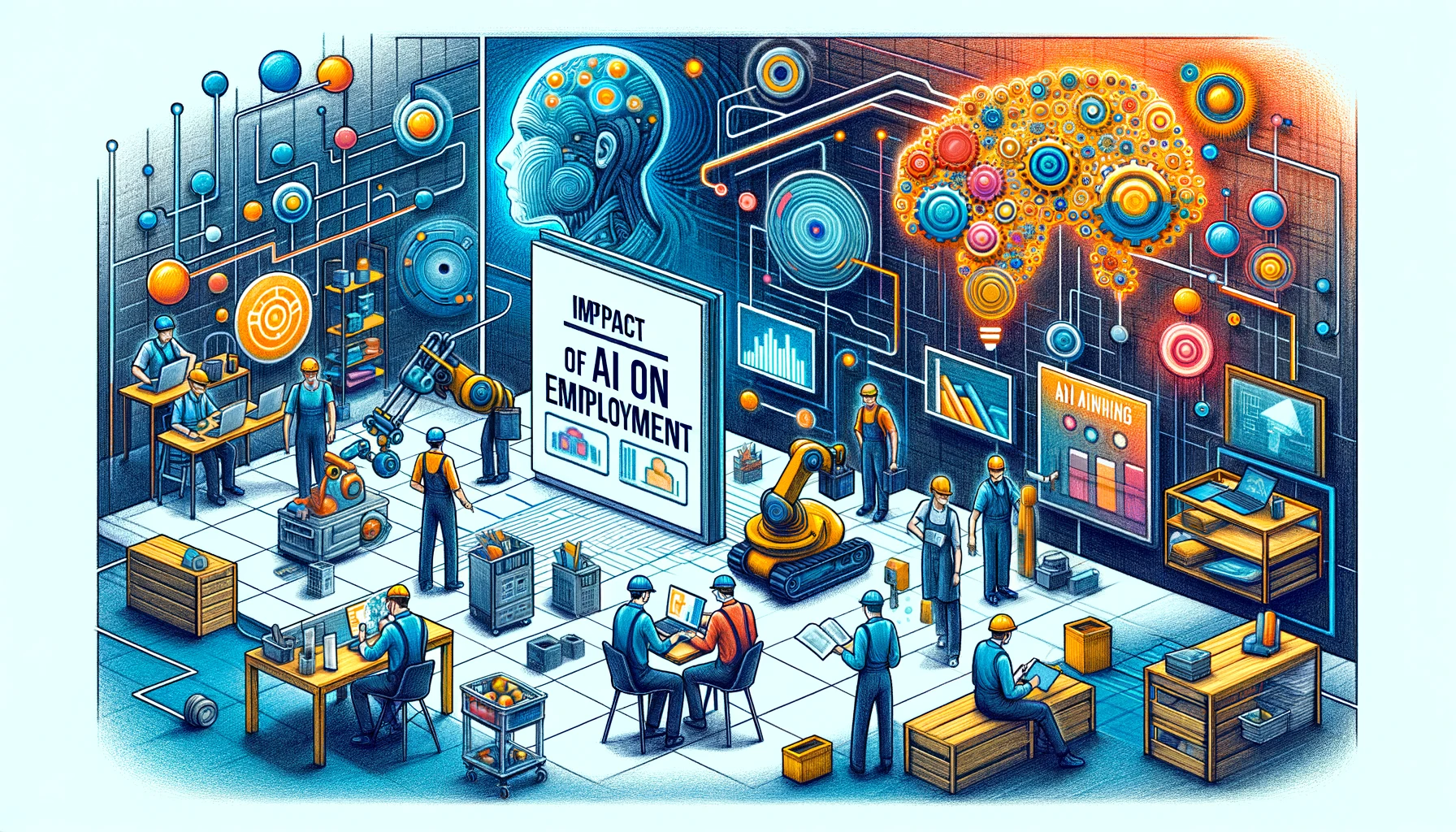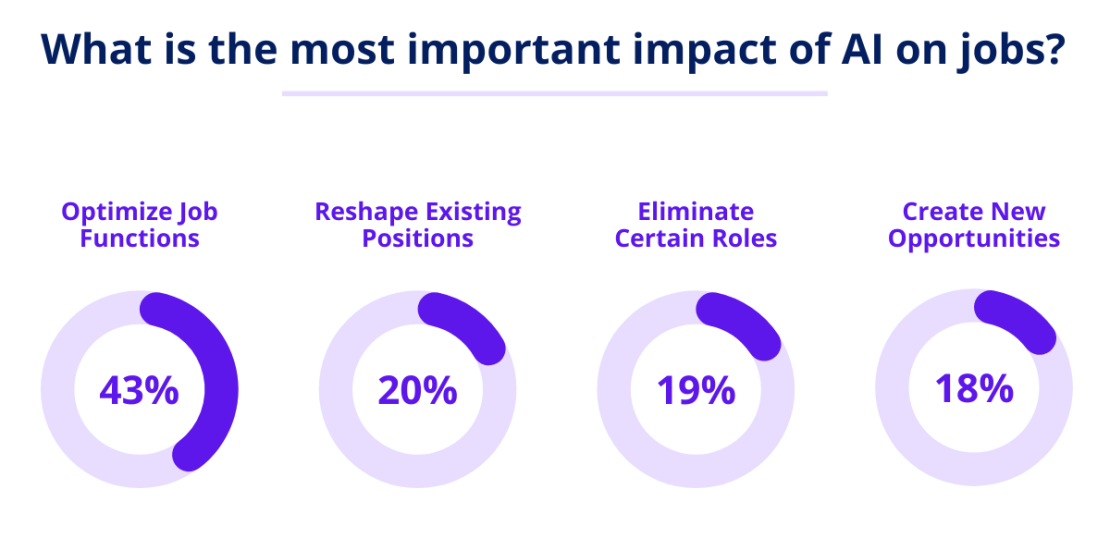Artificial Intelligence (AI) is transforming various sectors. Its impact on employment is profound.
AI’s influence on jobs is a hot topic today. Many wonder if it will replace humans or create new opportunities. Understanding AI’s role in the job market is essential. From automation to new job roles, AI reshapes work landscapes. Some jobs may disappear, while others will emerge.
It’s a balance of opportunity and challenge. Knowing how AI affects employment helps in adapting to these changes. This blog explores AI’s impact on jobs and what it means for workers. Stay tuned to learn more about this crucial topic.

Credit: artificialpaintings.com
Automation And Job Displacement
Automation is changing the job market. Machines and AI are taking over tasks once done by humans. This shift is causing job displacement. Some sectors are more at risk than others. The impact of automation can be seen in both the short and long term.
Vulnerable Sectors
Some industries are more vulnerable to automation. These sectors often involve repetitive tasks. Manufacturing is one such sector. Here, robots assemble parts and handle materials. Retail is another example. Self-checkout stations reduce the need for cashiers.
The transportation sector is also at risk. Self-driving cars and trucks could replace drivers. Customer service roles are impacted too. AI chatbots handle many customer queries. Data entry jobs are vulnerable as well. AI systems can input data faster and with fewer errors.
| Sector | Impact of Automation |
|---|---|
| Manufacturing | Robots assemble parts |
| Retail | Self-checkout stations |
| Transportation | Self-driving vehicles |
| Customer Service | AI chatbots |
| Data Entry | Automated data input |
Short-term Effects
The short-term effects of automation are visible. Job displacement is a major concern. Workers in vulnerable sectors may lose their jobs. They need to learn new skills to stay employed. Job training programs are crucial in this phase. These programs help workers adapt to new roles.
Companies may also see short-term benefits. Automation can increase efficiency. This leads to higher productivity. In turn, this can result in cost savings for businesses. They can then invest these savings in other areas. This might create new jobs in the long run.
Overall, automation brings both challenges and opportunities. The key is to manage the transition effectively. Workers need support to adapt to these changes. Companies need to balance automation with human employment.
Job Creation Through Ai
Artificial Intelligence (AI) is changing the job market. While some fear job loss, AI also creates new jobs. Many industries now need new skills. This change opens doors for many people.
New Industry Roles
AI leads to new job roles. Data analysts, AI specialists, and machine learning engineers are in demand. These roles need special skills. Workers must learn new things to fit these jobs. Companies are ready to train people. This training helps workers stay relevant. It also helps companies grow.
Other new roles include AI ethicists and AI trainers. AI ethicists ensure AI is used fairly. AI trainers teach AI systems to work better. These jobs did not exist before. Now, they are very important. This shift shows AI’s impact on job creation.
Entrepreneurial Opportunities
AI opens doors for entrepreneurs. Startups can use AI to solve problems. Many new companies focus on AI solutions. These companies need workers. They hire developers, marketers, and salespeople. This creates many job opportunities.
AI also helps small businesses. They can use AI tools to improve services. AI can handle repetitive tasks. This allows business owners to focus on growth. By doing so, AI supports job creation.
Freelancers also benefit. They can offer AI-based services. This includes AI consulting and AI tool development. These services are in demand. Freelancers can find many clients. This boosts the gig economy. AI, therefore, helps create many new jobs.
Skill Shifts In The Workforce
The rise of AI is changing job markets. Many traditional jobs are evolving. New jobs require different skills. This shift impacts workers globally. They need new skills to stay relevant. Let’s explore the key areas of change.
Demand For Digital Skills
AI is increasing the need for digital skills. Many roles now need tech knowledge. Workers must understand data analysis. Coding skills are also valuable. Digital literacy is becoming essential. Even basic roles require tech familiarity. Learning these skills is important.
Reskilling Initiatives
Reskilling programs are vital. Many companies offer training. Employees learn new, relevant skills. Governments support these initiatives too. They fund training programs. These efforts help workers adapt. Reskilling ensures job security. It also boosts confidence in the workforce.
Ai In Recruitment
Artificial Intelligence (AI) is transforming various industries. One significant area of change is recruitment. AI in recruitment enhances efficiency, fairness, and decision-making. It helps companies find the best candidates faster and more accurately.
Streamlining Hiring Processes
AI can streamline hiring processes by automating repetitive tasks. It can scan resumes, schedule interviews, and even conduct initial screening calls. These tasks traditionally take a lot of time. With AI, recruiters can focus on more strategic activities.
For instance, AI tools can match job descriptions with suitable resumes. This reduces the time spent on manual sorting. Additionally, AI can track applicants’ progress through the hiring pipeline, ensuring no candidate is overlooked.
| Task | Traditional Method | AI Method |
|---|---|---|
| Resume Screening | Manual Sorting | Automated Matching |
| Interview Scheduling | Email/Call Coordination | Automated Scheduling Tools |
| Initial Screening | Phone Interviews | AI-Powered Chatbots |
Bias And Fairness
AI in recruitment aims to reduce bias and increase fairness. Traditional hiring methods often involve unconscious bias. This can affect decisions and lead to unfair hiring practices.
AI algorithms can be designed to focus on skills and experience, rather than personal characteristics. This helps create a more diverse and inclusive workforce. However, it’s essential to ensure AI systems are free from biased training data.
Here are a few ways AI can help promote fairness:
- Blind resume screening, removing names and other personal details.
- Standardizing interview questions to ensure consistency.
- Analyzing language for biased terms in job descriptions.
AI can significantly improve recruitment. It streamlines processes and promotes fairness. However, it’s crucial to monitor AI systems and ensure they operate without bias.
Economic Implications
The rise of Artificial Intelligence (AI) is reshaping the economic landscape. AI influences productivity, income distribution, and job dynamics. This section will explore the economic implications of AI on employment and jobs.
Productivity Gains
AI can significantly boost productivity in various sectors. Machines can perform repetitive tasks faster and more accurately than humans. This leads to cost savings and increased output.
Consider manufacturing. AI-driven robots can work round-the-clock without breaks. This means higher production rates and fewer errors. Similarly, in the service sector, AI can handle customer queries efficiently. Automated systems can provide quick responses, enhancing customer satisfaction.
AI also aids in data analysis. Businesses can analyze large datasets in real-time. This helps in making informed decisions quickly. As a result, companies can adapt to market changes swiftly.
Income Inequality
The benefits of AI are not evenly distributed. This can lead to increased income inequality. High-skilled workers who can work with AI technology see wage increases. On the other hand, low-skilled workers may face job displacement.
AI automation can replace jobs that involve routine tasks. This affects workers in sectors like manufacturing, retail, and logistics. Job losses in these sectors can widen the income gap. High earners continue to thrive, while low earners struggle.
Moreover, AI-driven companies can dominate the market. They can offer better products at lower prices. Smaller businesses may find it hard to compete. This market dominance can contribute to income inequality.
| Sector | Impact of AI |
|---|---|
| Manufacturing | Higher productivity, job displacement |
| Service | Improved customer service, fewer low-skill jobs |
| Data Analysis | Quick decision-making, better market adaptation |
AI has economic implications that can reshape the job market. It is crucial to understand these impacts to prepare for future changes.
Ethical Considerations
Artificial Intelligence (AI) is changing how we work. This brings up several ethical considerations. As AI impacts employment, we must think about worker rights, regulations, and policies. These factors ensure a fair and secure work environment for everyone.
Worker Rights
AI may take over repetitive tasks. This could lead to job loss for some workers. People have the right to fair work conditions. Job displacement might affect their mental health and finances. Workers deserve support and retraining programs. These help them adapt to new roles created by AI.
Protecting worker rights is essential. Fair wages and job security should remain priorities. Ethical AI use should focus on improving work conditions. This ensures that workers benefit from technological advancements.
Regulation And Policy
Effective regulations are needed to manage AI’s impact on jobs. Policies should address job displacement and training needs. Governments must work with businesses to create fair rules. These rules help protect workers and ensure ethical AI use.
Clear policies can guide AI development and implementation. This will prevent misuse and ensure transparency. Regulations should promote AI that supports human work. This will foster a balanced, fair job market where AI and humans can coexist.
Future Workforce Trends
The impact of AI on employment and jobs is profound. The future workforce trends are evolving rapidly. Companies are adopting new technologies. These changes are shaping the way we work. Let’s explore some key trends.
Hybrid Work Environments
AI is making hybrid work environments more common. Employees can work both remotely and in-office. This flexibility increases productivity. AI tools facilitate better communication. Virtual meetings and collaborative platforms are now essential. They help teams stay connected. Hybrid work environments are here to stay.
Continuous Learning
Continuous learning is crucial in the AI-driven world. Jobs are changing fast. Skills need constant updating. Online courses and training programs are popular. They help workers adapt to new technologies. Companies invest in employee development. This ensures a skilled and adaptable workforce.

Credit: seo.ai

Credit: www.stage4solutions.com
Frequently Asked Questions
How Is Ai Impacting Employment?
AI is automating repetitive tasks, reducing the need for human labor in some sectors. However, it also creates new job opportunities in tech and innovation.
What Jobs Are At Risk Due To Ai?
Jobs involving routine, manual tasks are most at risk. This includes roles in manufacturing, data entry, and customer service.
Can Ai Create New Job Opportunities?
Yes, AI can create new job opportunities. It drives demand for AI specialists, data scientists, and technology developers.
How Can Workers Adapt To Ai Advancements?
Workers can adapt by learning new skills, particularly in technology and data analysis. Upskilling and continuous learning are key.
Conclusion
The impact of AI on jobs is undeniable. It brings both opportunities and challenges. Some jobs may vanish, while new ones will emerge. Workers need to adapt and learn new skills. Businesses must support training and development. AI can improve efficiency but requires careful management.
Balancing technology and human touch is key. Understanding AI’s role in employment helps everyone prepare. Let’s embrace change and grow together. The future of work depends on our readiness.